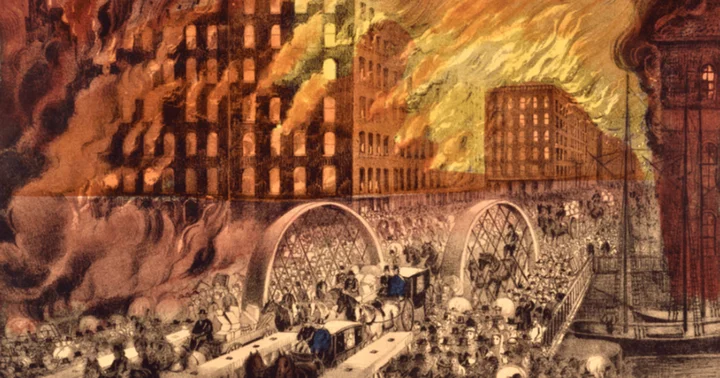CHICAGO, ILLINOIS: On October 8, 1871, a fire originating from a barn on Chicago's southwest side consumed the city for two days, killing approximately 300 individuals and rendering a third of the population homeless.
Following this catastrophic event, the "Great Rebuilding" initiative emerged to create a revitalized urban center. This endeavor led to the establishment of significant businesses, groundbreaking architectural structures, and the emergence of a new urban aesthetic.
Where did the Great Chicago Fire start?
Although the fire's origin is attributed to a barn owned by Patrick and Catherine O'Leary at 137 DeKoven Street on the southwest side of the city, the cause behind it remains shrouded in mystery.
The flames swiftly advanced north and east, engulfing Chicago's business district.
Over the course of two days, the relentless blaze claimed the lives of up to 300 people, obliterated 17,450 structures, displaced 100,000 individuals, and inflicted an estimated $200 million in damages, as per Britannica.
How did the Great Fire start in Chicago?
While a popular legend attributes the Great Chicago Fire to a cow accidentally knocking over a lantern in the O'Leary barn, alternative theories suggest human involvement or the possibility of a comet causing the catastrophic event.
The aftermath of the fire left a four-square-mile area of the Windy City, including its business district, in ruins. Chicago's susceptibility to fire was heightened by dry weather conditions and an abundance of wooden structures, streets, and sidewalks.
In 1870, the city experienced an average of two fires per day, with a notable occurrence of 20 fires in the week leading up to the Great Fire of 1871.
Why did the Great Chicago Fire cause so much damage?
In the summer and fall of 1871, Chicago experienced an arid period, with only a quarter of the usual rainfall occurring between July and October.
Moreover, the intense heat of the summer had left many of the city's wooden buildings and sidewalks parched.
On the beginning night of the fire, forceful southwesterly winds propelled the flames to great heights, creating convection spirals known as "fire devils," resulting in the ejection of burning debris in all directions, exacerbating the destruction of buildings.
The majority of structures concealed their wooden framework beneath a lone layer of fireproof material on the exterior.
One such building was the Waterworks on Pine Street. Although its roofing shingles had been replaced with slate, the core structure remained pine.
When a burning ember landed on the roof during the initial hours of the fire, the Waterworks succumbed rapidly.
Notably, the Waterworks served as the primary water source for the city's understaffed fire department, further compounding the challenges faced during the disaster.
How long did it take to rebuild Chicago after the Great Fire of 1871?
Chicago wasted no time in commencing its rebuilding efforts, with construction often starting before architects and engineers finalized the designs, and most of the rebuilding was completed within two years after the Great Fire of 1871.
Post-fire, legislative measures were implemented mandating the use of fireproof materials—such as brick, stone, marble, and limestone—in the construction of new buildings.
At the time of the fire, Chicago's population hovered around 324,000. Within a mere nine years, the city saw a substantial increase, boasting 500,000 residents.
By 1893, Chicago had evolved into a significant economic and transportation hub, with an estimated population of 1.5 million.









